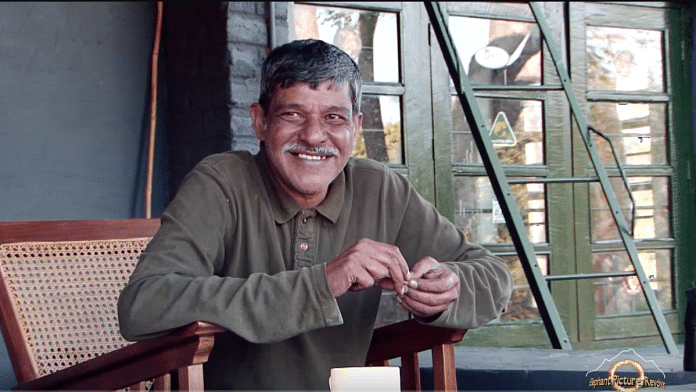Mark Davidar would wake up at sunrise, make himself some black tea with a squeeze of lemon, sit on the veranda, and wait for his guests—monkeys, elephants, deer, bears, tigers, and even hyenas.
The conservationist, who died due to a diabetic stroke on 19 October 2013, single-handedly created a safe space for the animals of Masinagudi in his home, Cheetal Walk, a forest shelter in the Nilgiris. He inherited the 30-acre private reserve in Sigur, Tamil Nadu, from his father ERC Davidar, a noted naturalist and author, and nurtured it into an elephant corridor.
“I’ve tried to live as close to nature…,” Mark says in a 2017 documentary, Cheetal Walk, before being interrupted by the trumpet of an elephant. He smiles, asking the director to pan the camera to the animal.
That is how many of his friends remember him. “He hated anything being written about him, his only message was about nature and protecting animals,” says actor Jinu Joseph, who first met Mark in 2008.
Mark’s environmental beliefs were personal convictions. “He took care of his home, just as anyone would take care of their house, except his home was the forest,” says Leah Samuel, Joseph’s wife and co-owner of a production house.
Also read: ISRO’s Seetha Somasundaram helped put India on the moon. Aditya-L1 is her latest success
Sharing a comfort level with animals
Born on 14 December 1959, Mark was a marine biologist by profession. He worked with ‘Birdman of India’ Salim Ali, studying sea turtles, and spent a few years at the Chennai Snake Park before moving back home in 1981 to set up a small guest house, Jungle Trails, in Cheetal Walk.
After 20 years of functioning, though, Mark decided to shut Jungle Trails down. “He stopped because he didn’t feel like he should be monetising his friends—the animals,” says Samuel. His home was still open, but only to a select few who were part of Mark’s inner circle.
Now, Cheetal Walk is maintained by his sister Priya and the Sigur Nature Trust, which their father had set up.
“Mark protected his space fiercely, and that included the energy people carried. It was part of why it was so magical,” says entrepreneur Joseph Dominic, who finally met Mark in 2007 after hearing about him in the late 1990s.
Dominic, who describes himself as an animal spirit, recalls that on his first visit to Cheetal Walk, an elephant charged at the veranda — but he and Mark didn’t flinch. This calmness around nature was important to Mark, who asked Dominic to stay on for a week.
“It was the biggest thrill of my life. On my first night itself I saw not one but five tigers,” he says.
Between his first and second cups of black tea, Mark would go to fill up the bird feeders.
According to Samuel, the animals flocked to Mark because he respected their space. “If he felt like there were animals around, he wouldn’t step out because that was their property first,” she says.
She recalls an incident when a tiger was heard roaring all night. “It was too late in the night to go out and look, but the next morning, [we saw that] there was tiger fur all over the veranda. That’s how comfortable animals were around him,” she says.
Also read: Shakuntala Devi’s literary legacy went beyond numbers—homosexuality, caste, murder, astrology
A true conservationist
Mark’s activism wasn’t rooted in grand gestures. “He’d walk around and uproot all the weeds around his property like parthenium and lantana just so the animals could walk a little more freely,” says Samuel.
He was extremely protective of his space — and with good reason. The land connects the reserved forests of the Kalhatti slopes with that of the Sigur plateau.
The Sigur Nature Trust says that without Cheetal Walk and its stewardship by the Davidar family, this “passage for wild animals in between two villages…may have been developed and the development would have contributed to merging the two surrounding villages, closing access to the Sigur River for wildlife.”
Mark was a conservationist in the truest sense of the word, his life was dedicated to conserving this elephant corridor. Here, regeneration was a success, and the evidence is in the variety of animals that frequented the property. Animals were calmer in Cheetal Walk, say visitors.
Mark created a successful model for not just preserving the forest but also mitigating human-animal conflict. The tusker Mark named Ronaldo was testament to this. The elephant was accused of killing people but was a frequent visitor to Cheetal Walk where Mark welcomed him with respect that was reciprocated.
Elephants and Mark
Out of all the animals that frequented his humble home, elephants were his favourite. “Mark believed the elephants acted as his bodyguards and with good reason too,” his father writes in Whispers from the Wild.
It’s a cliche, but Mark was an elephant whisperer, says Samuel. “He’d have really deep meaningful conversations with these elephants in English. They had a really special bond. They looked out for him.”
Mark’s favourites got the honour of being named after Brazilian football players. Among the 15 or so he named were Carlos, Kaka, Ronaldhino, and Rivaldo. His favourite, friends say, was Rivaldo.
The elephant visited Mark every day and came looking for him even after he died. “Davidar spoke to him in English and he understood and obeyed him. We could not make him understand that he is not here anymore,” recalled Murugan, the watchman of the property, in a 2013 interview with TOI.
Even now, when Rivaldo spottings are shared on X, many remember Mark’s association with the tusker.
“The elephants were his best friends,” Joseph says.
Samuel recalls how he would tell the tuskers “Okay, bye now, go drink some water, and come back at 4 pm”. And the elephants would actually turn up when the clock hit 4. “You really had to see it to believe it,” she says.
(Edited by Humra Laeeq)



